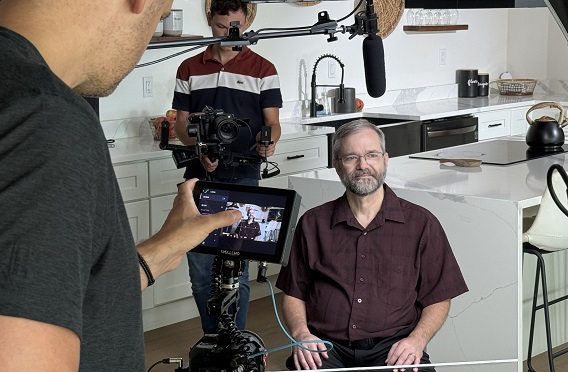10-Year Mesothelioma Survivor Talks Blessings, Faith and Stress
Health & WellnessWritten by Travis Rodgers | Edited by Amy Edel

Michael Cole was diagnosed with pleural mesothelioma in April 2015. He’s undergone an extrapleural pneumonectomy, chemotherapy, immunotherapy and radiation. Looking back over the last 10 years, Michael tells us he sees the way stress has been part of his journey from the initial shock of his diagnosis and throughout treatment. He shares that with support he’s learned to manage his stress over time.
A regular contributor to Asbestos.com and participant in webinars for survivors and caregivers, Michael Cole often shares his firsthand experiences with the mesothelioma community. He recently joined us for an exclusive video shoot for The Mesothelioma Center and we took the opportunity to interview him as well.
He talks about how blessed he feels to be a long-term survivor. And he shares how his faith and support has helped him through the stress that comes with a mesothelioma diagnosis.
Michael says, “The idea that the things I had planned and hoped for, that some of those wouldn’t come to pass. I’ve been blessed to have a life and to experience all the things that God’s given me. The opportunities, adventures and experiences. I mean, it would be kinda like a spoiled brat to say, ‘Oh, gee. I deserve more.’”
But he says while he is thankful for his blessings, stress is a reality when living with mesothelioma. He explains that in addition to coping with mesothelioma, you also have to manage the normal stresses of daily life.
“Suddenly you have to start dealing with everything we deal with in our normal life,” Michael says. “Everything is different, all the priorities change.”
Why It’s So Important For Mesothelioma Survivors to Manage Stress
Michael says if you’re reading this and dealing with mesothelioma-related stress, it’s essential you do something about it. He believes stress can have a big impact on your overall health and outcomes or mesothelioma prognosis.
“Understand that stress is probably going to be the biggest factor in whether you survive or not in the early stages,” Michael says. “It’s huge and you need to do everything you can, minute to minute, day to day, to reduce the stress.”
He advises, “If you become stressed over something, do everything you can to remove yourself from that situation to change the way you think about it. Whatever it is that you have to do to reduce that stress, do so.”
Personal Reactions to Stress and Its Impact on Overall Health
Michael says, “The stress was very noticeable in my case. When I was stressed, my pain levels would increase.”
He says he was surprised that symptoms he’d associated with recovering from mesothelioma surgery lasted for several years afterward. Then he realized it was stress-induced.
“For me, the pain level was just like someone stuck something in my side and was twisting it,” Michael shares. “I would get short of breath.”
The impact of stress on his body made him question whether he could handle even simple daily tasks, like going to the grocery store. Even minor stimulation would cause immediate and noticeable physical reactions.
“It’s just the body’s reaction,” Michael tells us. “Sometimes I didn’t even realize I was particularly stressed. At a conscious level, I was just a bit inconvenienced, but my pain level would start to rise and I’m like, ‘Come on. This is ridiculous.’”
Michael says he still feels pain and discomfort when his body is in a heightened state of alertness. Thankfully, he says his symptoms are less intense than they were in the past.
He says his surgeon recommended he see a psychiatrist after his surgery and chemo. His doctor said he’d understand why after he did.
“I went to a psychiatrist,” Michael recounts. “He explained how all of these chemicals in our body work. He said your body is in this condition when you experience stress or when something happens, whereas normally, certain hormone levels would rise and everything would stay in balance.”
In typical situations, heightened alertness can be helpful, but Michael’s body struggled to keep that response in balance. His fight-or-flight mode would activate, reacting as if there were a real threat, even when there wasn’t one.
“Your body overreacts. I would have effects similar to a panic attack when I was placed under stress,” Michael recalls. “There’s nothing I can do about it, which was very difficult, because I had always taken it for granted.”
Over time, Michael says he did learn some key ways to help himself manage his stress. This has helped him improve his mental health and overall wellbeing.
Recognizing and Reducing Stressful Situations
Michael acknowledges that much of the relief he feels from stress today is mostly thanks to the passage of time. He says he’s now able to handle more stress physically than he could in the period following his surgery.
“But it’s also just recognizing that I have to live my life in such a way as to manage the stress, to recognize when I may be putting myself in a position of too much stress and do something different,” Michael explains. “Or to think about a situation differently to minimize or negate the stress. Make an effort to enjoy things and do things that are relaxing.”
Michael says he and his wife Tania began planning short trips a day or two before doctor visits and tests. They chose places like the beach or a museum to help him relax before returning to work. He emphasizes that these quick getaways were essential because stress immediately affected his physical health.
Steering Through Stress With Personal Faith
Personal faith is also a major factor in Michael’s approach to managing his stress. He credits prayer as a way he can give thanks and feel like he isn’t carrying the weight of everything on his own.
“Prayer puts your whole being in a better position,” Michael says. “Then, when things come along, it’s easy to recognize.”
He says his faith has helped him tell himself, “This isn’t a big deal. I don’t have all of this on my shoulders and it’s only my responsibility to do what I have to do. No matter what, it’s going to be alright.”
That mindset helps him deal with stress and distress. Michael also says his time serving in a nursing home ministry deepened his personal faith. Through that experience, he says he saw firsthand how faith can help people through life’s challenges.
“I took part in a nursing home ministry for years and really loved doing that,” Michael recounts. “It was a really stark example to me of the power of faith exhibited in our physical lives.”
Michael adds, “I just believe that faith makes a huge difference in how we’re able to deal with something like this because we know that no matter what, we’re loved, we’re cared for and we’re looking forward to something better. This is one of my mantras: I can endure anything for a little while and this isn’t going to last forever.”
He also says that he feels being honest about how he’s feeling in his prayers has helped him manage pain and stress. Being open to the experience of his personal faith has benefitted him personally.
“By being honest, don’t be afraid to say, ‘I’m hurting, I’m weak or I don’t understand this,’” Michael says. “God knows, but you need to say it and then listen. Listen to what the Lord has to say. It’s not just about talking. That’s just half of a prayer. The other half is then listening, just being quiet and opening yourself. That’s so important.”







